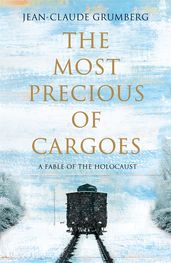The Most Precious of Cargoes
Jean-Claude Grumberg
Translated by Frank Wynne
Synopsis
Told in the gentle tone of a fable, Jean-Claude Grumberg’s The Most Precious of Cargoes tells the moving story of a woman who wanted a child, and a child who needed a home. It is a tale that teaches us that even in the darkest, most violent times, there is reason to believe in people’s capacity for kindness.
Once upon a time in an enormous forest there lived a poor woodcutter and his wife. Around them a war wages, and hunger is a constant companion. Yet every night, the woodcutter's wife prays for a child.
On a train crossing the forest, a Jewish father holds his twin children. His wife no longer has enough milk to feed them. In hopes of saving both their lives, he wraps his daughter in a shawl and gently throws her from the train.
While foraging for food, the woodcutter’s wife finds a bundle, a baby girl wrapped in a shawl. She knows that this little girl will be pursued, but she cannot ignore this gift: she will accept the precious cargo, and raise her as her own. . .
Set against the horrors of the Holocaust and told with a fairytale-like lyricism, The Most Precious of Cargoes, translated from French by Frank Wynne, is a deeply moving fable about family and redemption, a story that reminds us that humanity can be found in the most inhumane of places.
Details
Reviews
A magnificent small book to read urgently.
A fable about the Holocaust inspired by what [Grumberg’s] grandfather Naphtali experienced. He appeared in convoy number 45, which left Drancy on November 11, 1942 with 178 women, men and children on board. In convoy number 49, in March 1943, was his father. This tragedy . . . succeeds in mixing the light and the unbearable.
In a few years, the witnesses of the Shoah, those who knew the camps and returned, will no longer be there to tell what happened . . . To put into words what "negates all literature", the writer and playwright Jean-Claude Grumberg has chosen the form of a tale.
A tale is the best way to talk about what is hard to believe and imagine.
